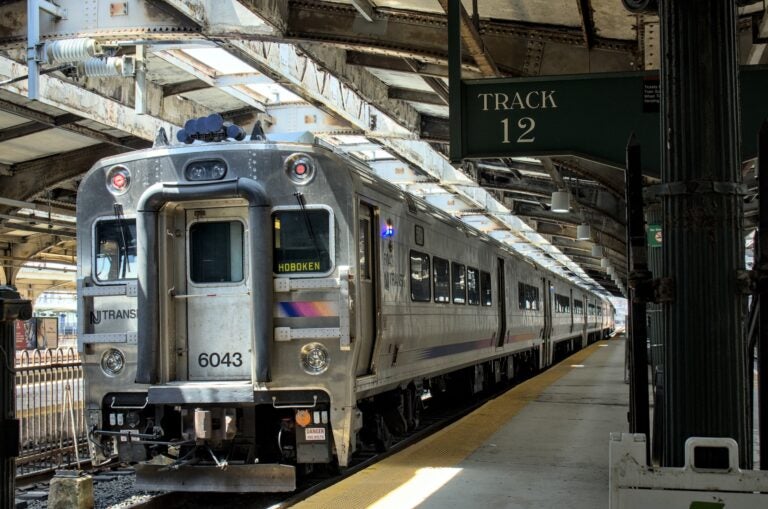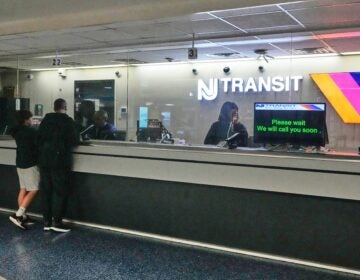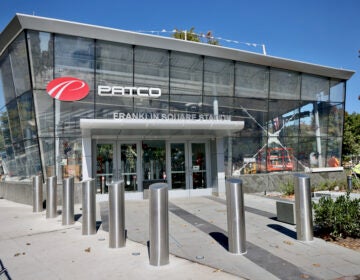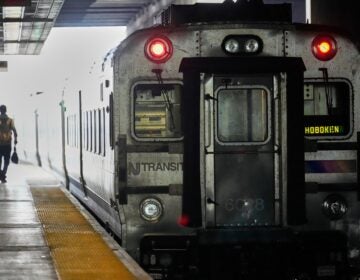NJ Transit looks to improve services ahead of fare hike and major events
The transit system is working with Amtrak to ensure trains run smoothly. NJ Transit is also adding new train cars and buses to improve rider experience.
Listen 2:07
A New Jersey Transit commuter train on a rail platform in Hoboken, New Jersey. (Yuri Yturetskiy/iStock)
From Camden and Cherry Hill to Trenton and the Jersey Shore, what about life in New Jersey do you want WHYY News to cover? Let us know.
NJ Transit dealt with a lot last summer.
More than 1,800 trains were canceled because of Amtrak’s infrastructure issues, the weather or mechanical problems. Agency CEO Kris Kolluri said his team is working hard and preparing to ensure that riders have a smoother experience going forward.
“That is the plan,” he said. “We not only have to worry about our regular commuting service, we also have to focus on those very big special events where a mass transit system has to work.”
When WHYY News spoke to Kolluri in late March, it was before NJ Transit’s first strike in more than 40 years. The strike was resolved within three days, but members of the union – the NJ Brotherhood of Locomotive Engineers and Trainmen, or BLET – still must vote to ratify the tentative agreement.
Kolluri, who was named head of New Jersey’s public transit agency last December, said 2025 is “not just a regular commuting year,” referring to the upcoming FIFA Club World Cup matches at Lincoln Financial Field in Philadelphia and MetLife Stadium in North Jersey. He said he is working “every waking day” to make sure the system works “as best as it can.”
“The way you do it is threefold: Focus on customer service, focus on reliable service and make sure you have the best equipment on the system,” Kolluri said.
Aging infrastructure, big promises
During last year’s “summer of hell,” the Northeast Corridor, owned by Amtrak, experienced issues with its catenary wire system, which powers trains along the corridor. Kolluri said Amtrak presented a plan to NJ Transit to ensure that the system does not cause problems this summer.
“We’re trying to work with Amtrak to make sure they make the improvements necessary to the corridor so we don’t have a repeat of the last summer,” he said. “I’ll be the first one to say that Amtrak is operating on 100-year-old infrastructure.”
Though Amtrak owns the rails, NJ Transit owns the cars that run on the network. Kolluri said the agency is working to make sure train cars are being repaired and replaced as quickly as possible. The agency will receive its first shipment of new multi-level cars during the first quarter of 2026.
“What we are committing to is a continuous improvement of the system that, frankly, has not seen the kind of attention that it required over the last 50 to 60 years,” he said.
In addition to new rail cars, the five-year, $767 million capital budget includes 1,000 new buses and improvements to the River Line light rail between Trenton and Camden and to the Atlantic City Line.
Asm. Clinton Calabrese, chairman of the Assembly Transportation and Independent Authorities Committee, said that NJ Transit “is as ready as it will ever be” recognizing the issues the system is facing.
“No one wants these systems to fail, but it’s old infrastructure,” he said. “Not to mention, we’re dealing with extreme weather events where the temperature is hotter for longer, and that adds to the pressure of the system itself.”
Fare hikes without service gains?
Gov. Phil Murphy said in 2019 he would rebuild NJ Transit, “if it kills me.” But riders are disappointed, according to Talia Crawford, advocacy and organizing manager at the Tri-State Transportation Campaign, an advocacy group.
“They’re going to be experiencing a 3% fare hike this coming July, and they’re not seeing major service improvements, such as increased frequency or service or reliability or any infrastructure improvements that they could visibly see in their daily commutes,” she said.
Last July, a 15% fare hike took effect, the first such increase in about a decade. The agency’s board also approved an annual 3% fare increase starting this year.
Kolluri cited the amount of time between fare increases.
He added that the agency’s two largest cost drivers are Access Link, the paratransit service, and the 20 commuter bus routes it took over for private bus carrier Coach USA, after that company declared bankruptcy last year.
“These two services are not just sort of sidebar services for us,” Kolluri said. “It’s not like the expenditures that we’re asking for the fare increase for is not being justified.”
Crawford does give Murphy credit for coming up with the Corporate Transit Fee, which charges the state’s most profitable corporations a 2.5% tax, to fund NJ Transit. But with the fee scheduled to sunset in 2028, she said a permanent, dedicated funding source is needed for the transit agency.
“There just needs to be more to keep New Jersey Transit going into the future,” Crawford said.
WHYY is your source for fact-based, in-depth journalism and information. As a nonprofit organization, we rely on financial support from readers like you. Please give today.







